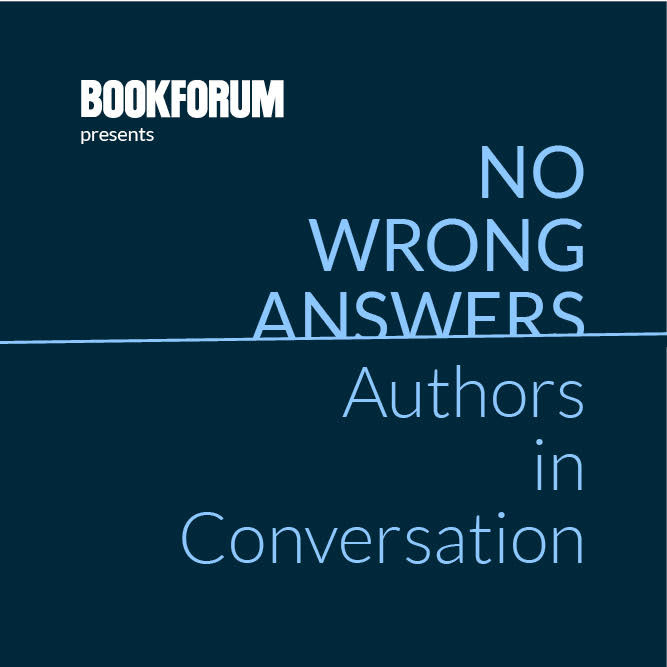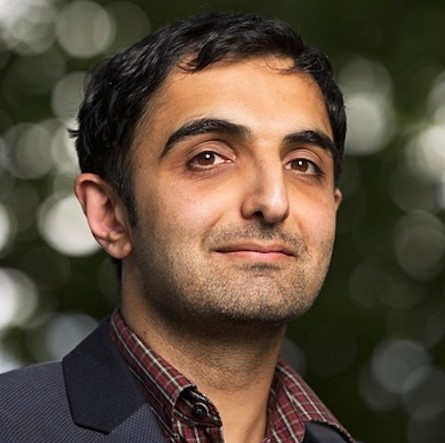Join Bookforum tonight at 7pm EDT for the first episode of our new video series, No Wrong Answers. Anuk Arudpragasam will talk about his Booker Prize–longlisted novel A Passage North with Megha Majumdar, whose own novel, A Burning, was a New York Times notable novel and was longlisted for the National Book Award. The event is free and will be streamed via Zoom. You can RSVP here. PEN America has posted videos from its 2021 World Voices Festival. The twenty-five videos include panels and conversations about literature with writers including George Saunders, Matthew Salesses, and Rivka Galchen on teaching
Tracy O’Neill Drawing on Carole Angier’s forthcoming biography, The Guardian’s Donna Ferguson speculates on what inspired Sebald to write novels “saturated with despair,” the lasting trauma of the holocaust, and suicide. Novels such as The Rings of Saturn and Austerlitz, Angier suggests, became Sebald’s means of grappling with his authoritarian father, a German soldier who fought in World War II. The realization that his father fought in Hitler’s army, and that his parents had benefited from the Nazis, caused Sebald long periods of depression, even breakdowns. Angier suggests that one particular breakdown was pivotal in his writing career: “It
Kenzaburō Ōe. Photo: Wikimedia Commons/Hpschaefer The New Yorker Union, along with the unions of Pitchfork and Ars Technica, have agreed to ratify a new contract. The unions operated through the NewsGuild of New York and negotiated with Conde Nast management for more than two years. The new agreement includes substantial victories for the unions, including wage increases, a salary floor, a diversity committee, and a ban on nondisclosure agreements, among other provisions. Nieman Lab reports on a new guide from the Dart Center for Journalism and Trauma advising journalists on how to write about traumatic events. As Joshua Benton writes,
Torrey Peters. Photo: Natasha Gornik Torrey Peters, author of Detransition, Baby, has four novellas coming out from Random House next year. Two of the books, Infect Your Friends and Loved Ones and The Masker, had been published online while the others are from unpublished manuscripts. Peters tweeted that Infect Your Friends and Loved Ones has also been optioned for film and television with “a director I think you will approve of.” The new Gawker.com has launched. In a letter from the editor, Leah Finnegan writes, “I ask you to approach this new iteration of Gawker with an open mind
Lauren Michele Jackson. Photo: Jorge I. Cotte For the New Yorker, Lauren Michele Jackson writes about the history of—and current campaigns against—critical race theory. Conservatives such as Christopher Rufo have gone out of their way to make critical race theory a right-wing target. Rufo “explained that he’d gone truffle-hunting for incendiary ideas in the works of scholars such as Bell, Crenshaw, and Angela Davis, whose names he had found in the footnotes of anti-racism best-sellers.” Meanwhile, Jackson writes, liberals hoping to combat conservatives such as Rufo have “worked themselves into a corner: in attempting to defend critical race theory,
Anuk Arudpragasam. Photo: Halik Azeez For the New Yorker, Andrew Marantz writes about the podcasts that have emerged in the wake of Chapo Trap House’s “near-monopoly on socialist podcasting,” with a focus on Matthew Sitman and Sam Adler-Bell’s Know Your Enemy. “Sitman and Adler-Bell are serious,” Marantz writes, “about the ‘know’ part of their title. They seem more ambivalent about the ‘enemy’ part. It’s not that they’re squishy about their politics: they have discussed at length what their socialist utopia would look like, and their only sustained disagreement during the 2020 primaries came in the form of Sitman, a
Emily St. John Mandel. Photo: Sarah Shatz Hilton Als considers the sui generis style and voice of Renata Adler’s novel Speedboat. “I don’t know of any journalist who’s had the pleasure of reading Renata Adler’s Speedboat and not dreamt of writing a book ‘just’ like it,” Als writes. “And that’s because the author’s brilliant stop and start 1976 novel about a female reporter living in an unnamed city glistens with authenticity, not only when it comes to her protagonist Jen Fain’s career as a journalist, but all the existential stuff that fucks your head up as you go about
Colson Whitehead. Photo: Chris Close In The Atlantic, Wright Thompson writes about what we still don’t know about Emmett Till’s 1955 murder. Thompson visits the barn in Drew, Mississippi where the fourteen-year-old was brought by a group of white men, and where he died. Many accounts leave the barn out of Till’s story. Today, the barn sits on a local dentist’s property, where Till’s family can visit. “The barn’s existence,” Thompson writes, “conjures a complex set of reactions: It is a mourning bench for Black Americans, an unwelcome mirror for white Americans. It both repels and demands attention.” “The
Fernando Pessoa. For the New York Times, Benjamin Moser reviews Richard Zenith’s new biography of the enigmatic Portuguese writer Fernando Pessoa. Best known for The Book of Disquiet, a fictional diary of fragmentary observation that was discovered and published after his death, Pessoa was an office worker who wrote under a range of names. As Moser observes, “He was a whole galaxy of writers—heteronyms, as he called them, with entirely different personalities and different, often radically conflicting, views on poetry, style, nature, politics and the antique.” In the London Review of Books, Gary Younge reviews We Own This City:
Douglas Stuart. Photo: Grove Atlantic Douglas Stuart, whose debut novel Shuggie Bain won the 2020 Booker Prize, has sold his second novel, Young Mungo, which is about “the dangerous first love of two young Glaswegian men.” The book will be published in April 2022 by Picador in the UK and by Grove Press in the US. The National Book Critics Circle hosted a conversation last week on racial consciousness in literary criticism with panelists David Mura, Lisa Teasley, and Myriam Gurba. A recording of the event is now up on YouTube. Molly Young profiles Katie Kitamura, author of the
Anthony Veasna So. Photo: Chris Sackes. Andrew LaVallee talks with friends and family of the late fiction writer Anthony Veasna So about the bittersweet release of his debut story collection; Afterparties “is now poised for the kind of buzzy release rare for debut collections.” Mark Krotov, publisher of n+1 and an early champion of So’s, said of his writing: “That combination of formal adventurousness and this feel for the texture and the sounds and the smells of day-to-day life—I find that quite rare.” While So’s incomplete novel will not be published as planned, Ecco will publish a book including
Adam Serwer Tonight at 7pm Eastern time, Atlantic writer Adam Serwer will discuss his new book The Cruelty Is the Point: Essays on Trump’s America with How to Be an Antiracist author Ibram X. Kendi. You can register to attend the virtual event here. Ben Cohen writes for the DC publication The Banter that Matt Tabbi—author of The Great Derangement and other books—has thrown “his considerable reputation down the toilet and joined the outer regions of far left/right conspiracy land.” Cohen laments the political contortions of Taibbi’s recent writing, particuarly in a piece on Fox News’s Tucker Carlson: “Taibbi
Jordan Pavlin. Photo: Karen Haberberg. Jordan Pavlin has been named the new editor in chief of Knopf, filling the spot left vacant since her predecessor, Sonny Mehta, died in 2019. Palavin has edited writers including Nathan Englander, Yaa Gyasi, Megha Majumdar, Ayana Mathis, Jenny Offill, Tommy Orange, Julie Orringer, Julie Otsuka, and Karen Russell. In a statement, Knopf publisher Reagan Arthur writes: “Jordan’s reading palate is broad, and her enthusiasm for fine storytelling infectious. She is always willing to go the distance for every writer on our list.” This fall, Patricia Highsmith’s diaries will be published for the first
Jenny Erpenbeck. Photo: Katharina Behling. At n+1 online, writers including Gregg Bordowitz, H. A. Sedgwick, Lauren Michele Jackson, Andrea Long Chu, and more remember Lauren Berlant, the pioneering author and theorist who died on June 28th. In her essay, Long Chu shares an email that Berlant sent her at the beginning of the pandemic: “Just checking in to see how you’re faring. How are you? I hope all of what’s intense is good, and all of what’s ordinary has lots of pleasures in it.” At the New Yorker, Lauren Oyler profiles the celebrated German writer Jenny Erpenbeck: “The selection
Sunjeev Sahota Plans for the Frankfurt Book Fair are moving forward, with many international publishers committing to participating at the in-person conference, which will take place October 20 through 24. Author, scholar, and activist Cornel West has posted his “candid letter of resignation” to Harvard University, which he says has succumbed to “intellectual and spiritual bankruptcy of deep depths.” West, a member of the faculty of the Harvard Divinity School, was recently denied tenure. “We all knew the mendacious reasons given had nothing to do with academic standards,” West writes of the university’s decision regarding his tenure. “I knew
Parul Sehgal Powell’s Books in Portland, Oregon, is celebrating its fiftieth anniversary this year. Powell’s, said to be the world’s largest independent bookstore, is curating a selection of fifty books to mark the occasion. On the store’s website, booksellers write that the list comes out of the past year of lockdown, which they compare to a “diabolic Chuck E. Cheese ticket blaster”: “It’s been a natural time to appraise how we got to this point of fracture and fragility, and how we heal; we want to know who we’ve been, and who we’re becoming, and for that we’ve always
Katie Kitamura (photo: Martha Reta) As D.C. museums begin to reopen, the Washington Post Podcast talks with poet-editor-essayist Kevin Young, the new director of the National African American Museum of History and Culture (and the author of the forthcoming poetry collection Stones). In an interview at the New Yorker, political philsopher and author Jan-Werner Muller (What Is Populism?), who “offers a new way of looking at Donald Trump, Narendra Modi, Jair Bolsolaro, and other right-wing leaders.” “Any of us can criticize the decisions of voters and, with regard to some of the leaders you just mentioned, there’s obviously plenty
Sally Rooney At the New Yorker, Sally Rooney discusses a new story, “Unread Messages,” published in this week’s issue. The author tells David Wallace about her fondness for the middle part of a story, before things need to be wrapped up: “In my non-working life, I play a little bit of chess (very poorly), and the phase of play that I like best is the middle game, after the formal opening is out of the way, when the idea of the game starts to clarify. As a novelist, I think I aim to sustain that middle-game feeling throughout the
Amy Sohn. Photo: Craig LaCourt. At Slate, Alexis Nowicki writes about confirming the suspicion that Kristen Roupenian’s viral short story, “Cat Person,” was based on details from Nowicki’s life. The author had never met Roupenian but discovered that an older man she’d dated did and told Roupenian about the relationship. When Nowicki asked Roupenian to comment, Roupenian said that the man had told her a “handful of facts” about dating a younger woman that she then fictionalized, and apologized for not changing the identifiable details. Still, Nowicki feels unsettled: “What’s difficult about having your relationship rewritten and memorialized in
Jessica Hopper At The Cut, Molly Fischer considers the factors that helped inspire a new literary genre: the email newsletter. The pandemic has been particularly hard on the careers of writers, who already had been facing increasing economic hardships before the events of 2020. Steve Borchert looks at how a twenty-first-century Federal Writers’ Project, inspired by the New Deal’s arts initiatives, would work: “Instead of hiring impoverished writers directly—as the Depression-era F.W.P. did—the new program would empower the Department of Labor to disburse $60 million in grants to an array of recipients, from academic institutions to nonprofit literary organizations,



















